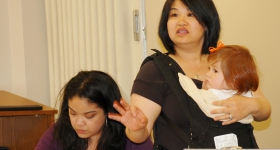Photo by Christopher DeWolf, retrieved from Urbanphoto.
With the London 2012 Summer Olympics just around the corner, Britain’s national tourist agency has issued an etiquette guide to help its notoriously persnickety citizens to welcome tourists.
While I’m sure the etiquette guide was written with the best of intentions, some of the culture clashes that VisitBritain is seeking to avoid read like a hilarious list of national stereotypes. Judging, anyway, from the information that I’ve been able to glean from other news sources. Sadly, the guide is an online database available to people in the tourism industry and I am not one of those people. But consider the following (my comments in parentheses):
- Don’t pour wine back-handed because that indicates hostility to South American visitors. Also, don’t assume that a person from Poland is a heavy drinker. That is an unfounded stereotype, because Poles are actually not big consumers of alcohol. (Fact: my boyfriend is Polish-ish and he is not a drunkard.)
- In general, visitors from India and the United Arab Emirates tend to be impatient. The more affluent Indians are, the more demanding they tend to be. Guests from the Middle East are similarly demanding. (For what? Prompt service and digestible food?)
- Argentines enjoy making jokes about a person’s clothing or weight, while Australians like to use coarse language. (So try not to take offense if someone calls you a “%^&$ @#*! fat slob”).
- Don’t wink or point at people from China and Hong Kong, as that is considered rude. And you can forget about making prolonged eye contact with the Japanese, who, by the way, smile to express a range of emotions, not just happiness. Also try not to bring up topics like poverty and failure. These topics should also be avoided when talking to Mexicans. Needless to say, immigration shouldn’t be mentioned at all -- Mexicans prefer to chat about art and history. (Except when poverty, failure, or immigration is involved).
- And of course, be patient with the Americans, who are informal to the point of rudeness, and tend to complain a lot. But don’t ever mistake Canadians for Americans. (The etiquette guide suggests looking for maple leaf pins on their clothing. For real.)
Sage advice, VisitBritain. More than anything, I think it’s very revealing of the cultural mindset of the British. I can’t help but wonder that the US tourism agency would’ve done in 2016 had Chicago won its bid for the Olympics. What would even pass as an etiquette guide in the US without sounding out-and-out racist?
Here’s what I’ve managed to come up with:
- The Chinese food served in Chinese restaurants generally isn’t anything like the Chinese food in, say, China. So don’t ask Chinese visitors about General Tso’s. The Olive Garden isn’t like, real Italian and -- you guessed it -- Outback Steakhouse didn’t pop out of the Australian outback. So, best not to use these culinary experiences as bonding entry points.
- In general, avoid controversial topics like recent US presidents, building mosques, and The Da Vinci Code. Discuss neutral topics instead, like Michael Jackson.
- Try not to mistake your fellow Americans as tourists from anywhere else in the world. I know it’s confusing, because we’re such a mixed bunch. You can definitely tell the Americans apart from the Canadians, though, because we won’t be wearing maple leaf pins.
-----
Other reading:
Snarky No More: UK Issues Olympics Guide
Don’t Mention the War! The Visit Britain Guide to Tourist Etiquette










Comments
- Controversial topics may include politics, religion, homosexuality, racism, abortion, criticism of the government, and criticism of an individual's patriotism. As in any country, locals generally do not take too kindly to constant criticisms of their government by foreigners.
It seems to me most people don't take too kindly to constant criticism of any kind.